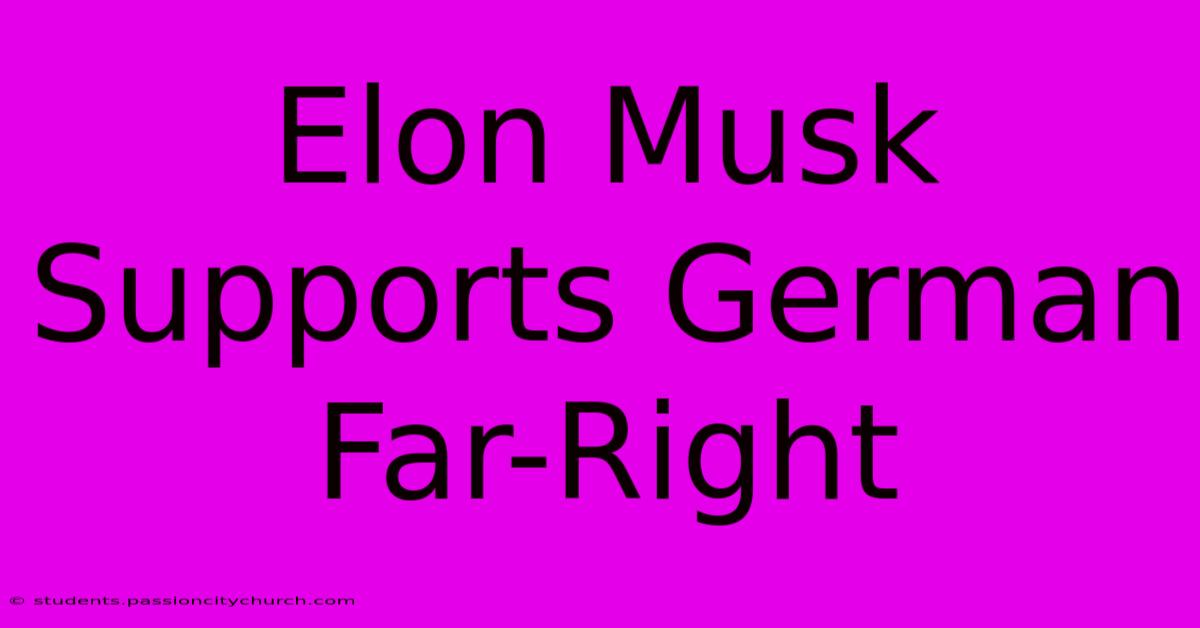Elon Musk Supports German Far-Right

Discover more detailed and exciting information on our website. Click the link below to start your adventure: Visit Best Website. Don't miss out!
Table of Contents
Dissecting the Narrative: Elon Musk and Allegations of Far-Right Support in Germany
The relationship between prominent figures and political ideologies is always a fertile ground for discussion and often, controversy. Recently, allegations have surfaced suggesting a connection between Elon Musk and Germany's far-right. This article aims to dissect these claims, analyzing the evidence presented, exploring potential interpretations, and examining the broader implications of such associations. It's crucial to approach this topic with nuance and critical thinking, avoiding the pitfalls of sensationalism and misinformation.
Understanding the Allegations:
The claims linking Elon Musk to Germany's far-right are multifaceted and often lack direct, concrete evidence. Many accusations stem from interpretations of his actions and statements, rather than explicit endorsements of specific far-right figures or ideologies. These accusations frequently cite:
-
Musk's use of social media: Critics point to Musk's tweets and posts on platforms like X (formerly Twitter) as evidence of tacit approval. Specific examples often involve perceived alignment with controversial opinions or figures associated with the German far-right. The lack of context and potential for misinterpretation makes these arguments inherently weak.
-
Business dealings in Germany: Musk's extensive business operations in Germany, particularly those related to Tesla and SpaceX, are sometimes interpreted as evidence of collaboration with or tacit support for the far-right. This argument lacks substantiation, as business activities are primarily driven by economic factors and market opportunities, not political affiliations.
-
Association with controversial individuals: The occasional interaction or association with individuals holding far-right views is frequently highlighted as evidence. However, the mere presence of such individuals in Musk's sphere doesn't automatically equate to endorsement. Context and the nature of the interaction are paramount.
Analyzing the Evidence (or Lack Thereof):
It's vital to acknowledge that the evidence connecting Elon Musk to Germany's far-right is largely circumstantial and open to interpretation. Much of the "evidence" relies on:
-
Selective interpretation of public statements: Musk's public statements are often provocative and deliberately ambiguous. Interpreting these statements as tacit support for the far-right often requires stretching their meaning beyond what is reasonably inferable.
-
Guilt by association: Simply associating with individuals who hold far-right views does not necessarily imply agreement with those views. Musk's expansive network of contacts includes a wide spectrum of individuals with diverse political beliefs.
-
Lack of direct evidence: No verifiable evidence exists showing direct financial contributions, explicit endorsements, or active campaigning by Elon Musk on behalf of any German far-right party or individual.
The Importance of Context and Nuance:
Analyzing the claims requires understanding the complexities of the German political landscape and the nuances of Elon Musk's public persona. Musk is known for his unconventional communication style, which often leads to misinterpretations. Furthermore, attributing political motivations to business decisions requires strong evidence, something largely absent in this case.
Counterarguments and Alternative Interpretations:
Several counterarguments exist to the narrative of Musk's support for the German far-right:
-
Focus on business objectives: Musk's primary focus is on his business ventures. His actions in Germany are primarily driven by economic interests, such as establishing manufacturing facilities and expanding market reach.
-
Ambiguous public persona: Musk's public persona is deliberately provocative and often controversial. His statements should be interpreted cautiously, considering his penchant for unconventional and sometimes inflammatory rhetoric.
-
Lack of consistent pattern: There's no discernible pattern of consistent support for far-right ideologies in Musk's public statements or actions. Accusations often rely on isolated instances, neglecting the broader context.
The Dangers of Misinformation and Sensationalism:
Accusations lacking robust evidence can be harmful. Spreading unsubstantiated claims without rigorous fact-checking can lead to the dissemination of misinformation, negatively impacting public discourse and potentially damaging reputations unjustly. It's crucial to maintain a high standard of evidence-based analysis before drawing conclusions about individuals' political affiliations.
Conclusion: A Need for Critical Analysis:
The allegations linking Elon Musk to Germany's far-right require critical evaluation. While some instances might appear questionable, a lack of concrete evidence necessitates caution against jumping to conclusions. Attributing political motivations to business decisions or interpreting ambiguous public statements as endorsements requires strong evidence. The focus should be on verifiable facts and rigorous analysis, avoiding sensationalism and the spread of misinformation. A balanced and nuanced approach is essential in understanding the complex relationship between public figures, political ideologies, and the ever-evolving media landscape. Further investigation, based on credible evidence, is needed to reach a more definitive conclusion. Until then, it's crucial to maintain a healthy skepticism and avoid perpetuating unverified accusations.

Thank you for visiting our website wich cover about Elon Musk Supports German Far-Right. We hope the information provided has been useful to you. Feel free to contact us if you have any questions or need further assistance. See you next time and dont miss to bookmark.
Also read the following articles
| Article Title | Date |
|---|---|
| 85mph Winds Expected Yellow Weather Alert | Dec 21, 2024 |
| Polizei Einsatz Magdeburg Weihnachtsmarkt Gesichert | Dec 21, 2024 |
| Listen To Szas Latest Album | Dec 21, 2024 |
| Kendrick Joins Sza On New Album Lana | Dec 21, 2024 |
| Goles Y Resumen Bayern Munich Vs Leipzig | Dec 21, 2024 |
| Bayern X Leipzig Onde Assistir Ao Jogo | Dec 21, 2024 |
| Winter Solstice Celebrating As A Pagan | Dec 21, 2024 |
| Campeonato Italiano Verona X Milan Na Tv | Dec 21, 2024 |
| Fallece Miguel Angel Lopez Diaz Rey Mysterio Sr | Dec 21, 2024 |
| Bayerns 5 1 Triumph Over Leipzig | Dec 21, 2024 |
